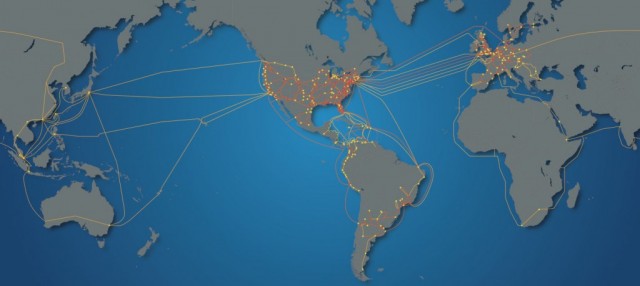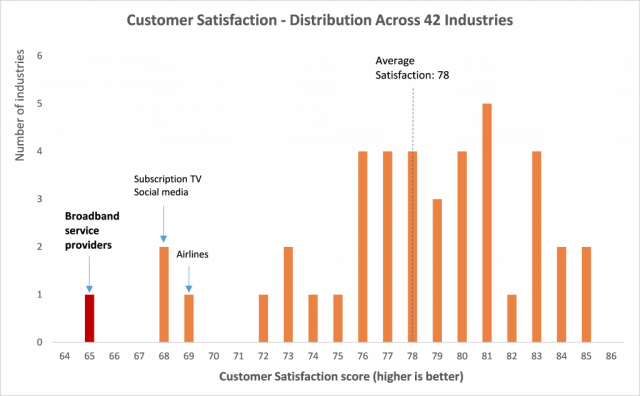 As of May 1st, Frontier Communications has raised the price of its standalone DSL service $5 a month, primarily because its competitors have also raised prices.
As of May 1st, Frontier Communications has raised the price of its standalone DSL service $5 a month, primarily because its competitors have also raised prices.
Current subscribers to Frontier’s basic 6Mbps ADSL service Simply Broadband will continue to pay $29.99 a month for now, but new customers will see a rate increase to $34.99.
“We increased the price [… because it] better reflects the value of that offering, given the robust capability of our network and comparable pricing from our competitors,” Frontier CEO Maggie Wilderotter told Wall Street analysts on a quarterly results conference call.
Frontier also announced Frontier FiOS TV price increases that “reflect increasing programming costs” also taking effect this month.
Frontier added 37,000 new broadband customers during the first quarter, a record for the company and the fifth consecutive quarter of broadband customer growth. Frontier increasingly depends on broadband to retain existing customers and develop new customer relationships in rural areas where broadband service has not been available in the past.
“As of April, 74% of our customers have access to 12Mbps, up from 60% in the fourth quarter,” said chief operating officer Dan McCarthy. “Now 61% of households we pass can get 20Mbps or greater, and 83% can get 6Mbps. At the end of the fourth quarter in 2012 only 40% of our network was capable of 20Mbps and only 50% was capable of 12Mbps.”
 Despite the speed increases, cable competitors still made their presence known. Most cable companies sell faster service than Frontier offers and on the low-end, Time Warner Cable’s 2Mbps $15 broadband package, marketed to current DSL customers, was acknowledged to have an impact by Wilderotter, but not enough to bring a significant change in competitive intensity.
Despite the speed increases, cable competitors still made their presence known. Most cable companies sell faster service than Frontier offers and on the low-end, Time Warner Cable’s 2Mbps $15 broadband package, marketed to current DSL customers, was acknowledged to have an impact by Wilderotter, but not enough to bring a significant change in competitive intensity.
Frontier continues to argue that broadband speeds are simply not that important to most customers. McCarthy claimed that less than 20% of Frontier’s broadband customers subscribe to speeds above 6Mbps.
“Quite frankly we’ve had focus groups with our customers and potential customers […] and what they say is that they don’t really know what speed they have,” McCarthy said. “They just need enough and that’s really what it’s about — providing a good quality product that’s reliable and gives them the speed that they need. It’s not necessarily a 60Mbps connection that they’re really never going to use.”
“We’ve also found [in the focus groups that we do] that a lot of customers, even those upgrading to higher speeds don’t really change their behavior,” Wilderotter added. “It’s not like they have 10Mbps more so now they’re a gamer. They just keep doing the same thing they were doing before. We still have the majority of our customers taking around 6Mbps and they have a choice to go up but they decide that that’s enough for what they’re doing and we’re happy to sell them just what they need.”
Frontier has also reduced its landline losses nationwide to 9,600 during the last quarter. It will begin running advertising this year that reminds customers landline service is often more robust than wireless or Voice over IP during power or weather-related outages. Wilderotter said emphasizing the traditional landline as a protective and security measure really resonates with Frontier’s customers.


 Subscribe
Subscribe


 However, Taylor says more than a year ago, something suddenly changed at five U.S. Internet Service Providers. They stopped periodic upgrades and allowed some of their connections to become increasingly busy with traffic. Today, six of Level 3’s 51 peer connections are now 90 percent saturated with traffic for several hours a day, which causes traffic to degrade or get lost.
However, Taylor says more than a year ago, something suddenly changed at five U.S. Internet Service Providers. They stopped periodic upgrades and allowed some of their connections to become increasingly busy with traffic. Today, six of Level 3’s 51 peer connections are now 90 percent saturated with traffic for several hours a day, which causes traffic to degrade or get lost. In fact, Netflix traffic seems to be a common point of contention among Internet Service Providers that also sell their own television packages. They now insist the streaming video provider establish direct, paid connections with their networks. Level 3 is affected because it carries a substantial amount of traffic on behalf of Netflix.
In fact, Netflix traffic seems to be a common point of contention among Internet Service Providers that also sell their own television packages. They now insist the streaming video provider establish direct, paid connections with their networks. Level 3 is affected because it carries a substantial amount of traffic on behalf of Netflix. In North America, the best prices, rebates and packages are only available to new customers while customer loyalty is rewarded with rate hikes.
In North America, the best prices, rebates and packages are only available to new customers while customer loyalty is rewarded with rate hikes.


